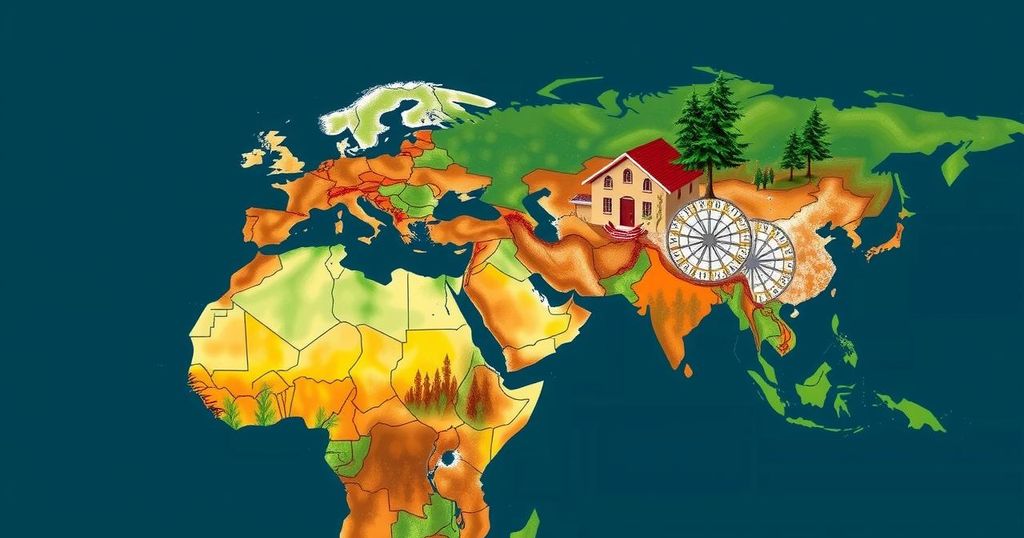Richer nations are starting to compensate poorer countries for climate change damages, exemplified by payments made to families affected by Cyclone Freddy in Malawi. This funding addresses the disproportionate impacts low-income countries face due to climate-related disasters. With a pledged $720 million fund, negotiations at COP29 aim to refine the allocation of resources to those in greatest need as climate crises escalate.
In the early hours, Christopher Bingala experienced devastating floods resulting from Cyclone Freddy, the longest-lasting tropical cyclone recorded, which struck southern Malawi in 2023. While he managed to evacuate his six children to safety, he lost his home and livestock. As a subsistence farmer, Bingala lacked the means to rebuild his life until he received a compensation payment of approximately $750, enabling him to construct a new dwelling for his family.
The compensation received by Bingala represents one of the initial instances of “loss and damage” funding, aimed specifically at addressing climate change-related calamities. Wealthy nations, which have historically contributed to climate change through emissions, have recognized the dire situation of impoverished countries that experience greater climate impacts yet contribute little to global pollution. At the latest climate summit, COP29, negotiations continue regarding compensation for developing nations, with a focus on a broader climate finance package involving loans and investments.
Cyclone Freddy displaced approximately 650,000 individuals across Malawi, with many experiencing chronic food shortages. Bingala recounted the hardships his family faced, having to resort to eating deceased livestock due to food scarcity. Fortunately, following his cash payment, Bingala relocated to a safer area, situated away from the flood risks he had previously faced, and gradually began to rebuild his life.
The payment to Bingala was facilitated by the Scottish government, making it the first nation to dedicate funding for climate-related loss and damage, with distributions managed by GiveDirectly, a nonprofit organization. This initiative has provided support to approximately 2,700 families in Malawi, helping many to recover economically by rebuilding homes, investing in agriculture, and facilitating education for children.
The funding initiative in Malawi serves as a prototype for a more extensive system designed to compensate lower-income nations disproportionately affected by climate change. Significant support for these funding efforts has been acknowledged, but much remains to be done before adequate solutions can be implemented to assist those in dire need.
Developing countries, already burdened by significant debt, face heightened vulnerabilities due to climate-induced disasters. The Prime Minister of the Bahamas, Philip Davis, noted the national debt implications of Hurricane Dorian’s aftermath, indicating that climate-related expenses must often be covered through borrowing. The COP29 summit aims to establish clear guidelines for fund allocation, as existing commitments amount to $720 million, with an increasing recognition that the need for loss and damage funding is anticipated to escalate dramatically in the coming years.
Davis warned that without intervention, the humanitarian crises spawned by climate change will spill over borders, resulting in dire consequences for all nations. As climate-related disasters exacerbate, the call for support from wealthier countries becomes increasingly urgent.
The potential economic consequences of failing to address climate change are stark and could crystallize into a global crisis if low-income populations are not supported. Recognizing the moral and pragmatic reasons for assisting those most affected is not merely an act of charity, but a necessity for sustainable global development.
The recent initiative to provide compensation for climate change losses stems from the recognition that poorer nations, often least responsible for greenhouse gas emissions, suffer significantly from environmental degradation and disasters. The establishment of a loss and damage fund is a result of years of advocacy from vulnerable countries affected by extreme weather events exacerbated by climate change. Given historical emissions primarily from developed nations, the initiative seeks to address equity and financial justice in the ongoing fight against climate change while supporting affected communities in rebuilding and recovery efforts.
In conclusion, the establishment of loss and damage funding represents a significant step toward addressing the inequitable impacts of climate change on developing countries. As wealthier nations acknowledge their historical contributions to global emissions, ongoing commitments and the urgency for supplemental funding must be prioritized. Failure to act decisively could lead to increased humanitarian crises, highlighting the interconnectedness of climate change, economic stability, and human livelihoods. Thus, it remains imperative for the global community to prioritize climate justice and support vulnerable populations.
Original Source: www.southcarolinapublicradio.org






